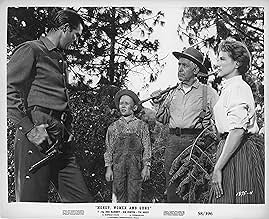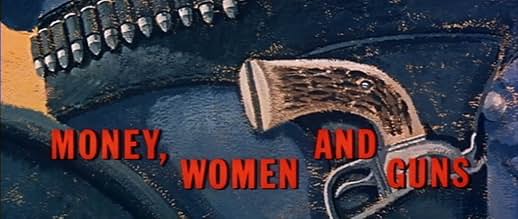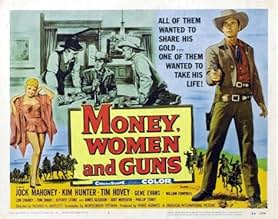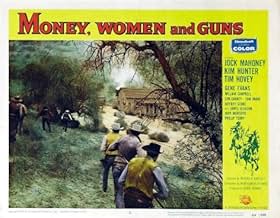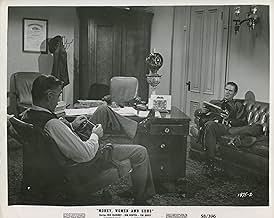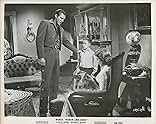ÉVALUATION IMDb
6,2/10
452
MA NOTE
Ajouter une intrigue dans votre langueAfter a gold prospector is killed by masked robbers, a detective is hired to find the surviving killer as well as the prospector's legal inheritors.After a gold prospector is killed by masked robbers, a detective is hired to find the surviving killer as well as the prospector's legal inheritors.After a gold prospector is killed by masked robbers, a detective is hired to find the surviving killer as well as the prospector's legal inheritors.
Lon Chaney Jr.
- Art Birdwell
- (as Lon Chaney)
Judi Meredith
- Sally Gunston
- (as Judy Meredith)
Rodney Bell
- Martin
- (uncredited)
Jack Daly
- Livery Stable Man
- (uncredited)
Steve Darrell
- Sheriff Madsen
- (uncredited)
Franklyn Farnum
- Postmaster
- (uncredited)
Avis en vedette
Jock Mahoney, TV's Range Rider, stars in this routine B-western involving gold, pretty gals and greed. Mahoney, who had also doubled for Charles Starrett in the Durango Kid movies, strikes an imposing figure in this routine oater.
Kim Hunter and the always reliable Gene Evans turn in decent performances as Jocko tracks down the heirs to a fortune in gold. The budget as well as the writing are barely adequate, but the cast makes the best of a familiar plot. Look also for the great Lon Chaney, Jr. in another post-Wolfman supporting role.
Recommended for B-western fans only .....
Kim Hunter and the always reliable Gene Evans turn in decent performances as Jocko tracks down the heirs to a fortune in gold. The budget as well as the writing are barely adequate, but the cast makes the best of a familiar plot. Look also for the great Lon Chaney, Jr. in another post-Wolfman supporting role.
Recommended for B-western fans only .....
The title itself just about sums up Hollywood film production. Kidding aside, this Western's got a number of nice touches, and with a more involved director (Bartlett) and dynamic lead (Mahoney), could have gelled into a genuine sleeper.
It's got an unusual mystery premise for a Western— detective Hogan has to figure out which beneficiary killed the wealthy old miner— as well as a cast of former A-players— Chaney, Drake, Evans, Gleason, and Terry. But especially, there's Kim Hunter who only a few years earlier picked up a heavyweight Oscar for A Streetcar Named Desire (1951).
I suspect it's a better than the average B-production because of studio (Universal) backing. That backing leads to some scenic locations, fine color photography, and the supporting cast of familiar faces. Also, the unconventional script contains some nice ironies, along with a few surprises. In fact, calling this a pacifist Western may not be too much of a stretch.
Mahoney certainly looks the part of a Western hero, but unfortunately more or less walks through his part in a perfectly tailored outfit. Then too, director Bartlett does nothing to draw us further into the story-- as a result, we remain on the outside, looking in. Anyway, it remains a Western of fine visuals with an unusual storyline, despite the two central drawbacks.
It's got an unusual mystery premise for a Western— detective Hogan has to figure out which beneficiary killed the wealthy old miner— as well as a cast of former A-players— Chaney, Drake, Evans, Gleason, and Terry. But especially, there's Kim Hunter who only a few years earlier picked up a heavyweight Oscar for A Streetcar Named Desire (1951).
I suspect it's a better than the average B-production because of studio (Universal) backing. That backing leads to some scenic locations, fine color photography, and the supporting cast of familiar faces. Also, the unconventional script contains some nice ironies, along with a few surprises. In fact, calling this a pacifist Western may not be too much of a stretch.
Mahoney certainly looks the part of a Western hero, but unfortunately more or less walks through his part in a perfectly tailored outfit. Then too, director Bartlett does nothing to draw us further into the story-- as a result, we remain on the outside, looking in. Anyway, it remains a Western of fine visuals with an unusual storyline, despite the two central drawbacks.
1958's "Money, Women and Guns" was a somewhat modest color B-Western from Universal, where Jock Mahoney was coming off his one science fiction title, "The Land Unknown." Elderly prospector Ben Merriweather (Edwin Jerome) is bushwhacked by a trio of masked marauders, two of which are killed in a brief shootout. In his final moments, the dying man writes out his last will and testament, leaving his wealth to a half dozen beneficiaries, and it's up to Mahoney's frontier detective 'Silver' Ward Hogan to track each one down. One is played by William Campbell, an ex-con struggling to go straight alongside young wife Judi Meredith (both worked for Roger Corman in 1966, Campbell in "Track of the Vampire" and Meredith in "Planet of Blood"). The youngest is David Kingman (Tim Hovey), a little boy whose only contact with Merriweather was a conversation about Santa Claus; his widowed mother (Kim Hunter) takes a shine to the wandering loner that David worships. One self contained vignette teams James Gleason's Henry Devers with Lon Chaney's Art Birdwell; Devers was Merriweather's former prospecting partner, who sends his poker playing partner Birdwell into town to cash his $50,000 beneficiary check. Jeffrey Stone followed up with "The Thing That Couldn't Die," while Phillip Terry did "The Leech Woman" (Tom Drake worked with Chaney in 1956's "The Cyclops" and 1966's "House of the Black Death"). As for Chaney, this innocuous little Western marked his final credit for Universal, the studio that cast him adrift following 1945's "House of Dracula," calling him back on only four occasions, the first three being 1948's "Abbott and Costello Meet Frankenstein," 1951's "Flame of Araby," and 1952's "The Black Castle" (he previously worked for director Richard H. Bartlett in 1955's "The Silver Star," for Lippert Pictures).
A prospector has been murdered. He has left a will splitting a quarter of a million dollars among five heirs. The problem is no one is sure who they are. Detective Jock Mahoney is assigned to track them down, and to figure out why the dead man chose them.
Maohoneyis rather stiff in his line readings, and his outfit looks odd, all velveteen and bright silver buttons for riding the range. Even so, it's an interesting Shaky A western from Universal, not only for the figuring out of the why of the mystery, but for some casting, including Kim Hunter, and James Gleason in his last screen role.
Maohoneyis rather stiff in his line readings, and his outfit looks odd, all velveteen and bright silver buttons for riding the range. Even so, it's an interesting Shaky A western from Universal, not only for the figuring out of the why of the mystery, but for some casting, including Kim Hunter, and James Gleason in his last screen role.
This would have been a "prestige" western at the time, in color and Cinemascope, with recognizable stars. It keeps your interest despite the many broken promises.
First of all, the Cinemascope lens was plopped down on soundstages, wasting the panorama. The title is misleading. "Money" figures in the plot, granted. But I counted only two "Women." Neither projected the woman in the lobby poster (a soiled dove stripped down to her skivvies), being, instead, hardy frontier stock. And "Guns" suggests action that never really materializes.
Jock Mahoney was a legendary stuntman. He was pushing 40 by the time of this production, but still had a couple Tarzan roles in his future. You can see effortless grace in his movement, apparently weightless. Horseback, Mahoney appears to glide across the prairie hovering above his pounding steed. Mahoney's fight choreography was unsurpassed until the Hong Kong kung fu school a generation later. The script and direction simply declined to tap the resource. The fashion in westerns by the late '50s had shifted from action to the talk-burdened, angsty "psychological western."
In the early '50s there was a glut of syndicated half-hour westerns to fill the maw of local programming until networks could supply their own content. These were unabashed orgies of fistfight, shoot-out and horseplay (I mean on horses), with surprising amounts of plot - and absolutely no suspense: the hero brought the bad guy to justice. Within their formula, these actioners were brilliant catalogs of stunt work. They far surpassed the action scenes in big budget big screen productions. (John Wayne, just for example, was a lousy stage fighter. He had this big roundhouse right that took forever to land. Hey, bad guy! Move out of the way! Duck and land a couple uppercuts before that punch completes its orbit!)
Jock Mahoney as "The Range Rider" was hands-down the greatest of the syndicated cowboys. Simply mounting and dismounting were done with gymnastic flourish - even holstering his gun. No runaway stage went unboarded. No picket fence went unhurdled. No stick of furniture in a brawl went unsmashed. No monolithic boulder went unjumped up on or down from. These shows were the bridge between the astonishing physicality of the silent movie comedians and the flying fists of the chop-saki masters.
By the late '50s, oaters dominated network primetime. They strove to stand out from each other by issuing odd weaponry, or creating weird hybrids: the urbane western, the spy western, the jazz western. (Nobody thought to bring back the singing cowboy.)
"Money, Women and Guns" feels a lot like a pilot for a TV series. The story plays out episodically as our hero tracks down suspects in the murder of a rich old prospector. The suspects are also the beneficiaries of his will. We learn how the suspects were associated with the dead man. (Sort of a sagebrush "Citizen Kane".) Mahoney plays "Silver" Ward Hogan, a self-described "detective", not a bounty hunter or territorial marshal. Indeed, Hogan owes as much to Joe Friday as the Lone Ranger. The story is carried by the mystery. It also has some of the quality of "Law & Order" in that the first character suspected is never the murderer-unless, of course, the investigation circles back to him. I'm not saying it does or doesn't.
Le saviez-vous
- AnecdotesLon Chaney Jr's last film for Universal.
- GaffesIn an early scene, if you keep an eye on Ben Merriweather as he scrawls out his dying note, there's no way his erratic, shaking hand could have produced anything legible.
- Bandes originalesLonely Is The Hunter
Composed and Sung by Jimmy Wakely
Meilleurs choix
Connectez-vous pour évaluer et surveiller les recommandations personnalisées
Détails
- Durée
- 1h 20m(80 min)
- Rapport de forme
- 2.35 : 1
Contribuer à cette page
Suggérer une modification ou ajouter du contenu manquant


